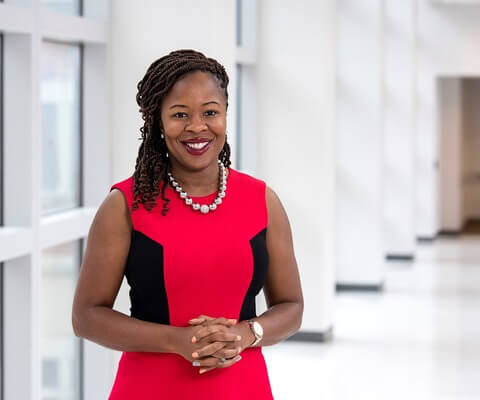Dr. Jacqueline Nwando Olayiwola, MD, MPH, is a Nigerian-American Physician, Professor, Author, Speaker, Consultant, and Health Equity Leader. Dr. Olayiwola is an expert in community and social determinants of health, technological innovations, and the intersection of social justice and healthcare. She has made a remarkable contribution to the healthcare industry through her tireless advocacy for the healthcare of underserved populations, women, and girls.
Born in Nigeria, Dr. Olayiwola moved to the United States with her family at a young age. Her experiences as a first-generation immigrant fueled her desire to pursue a medical career, driven by a passion for helping others. After training in the renowned Commonwealth Fund Harvard University Fellowship in Minority Health Policy, she started her journey as a primary care physician in one of the most underserved parts of Connecticut. She says, “It was here that I learned firsthand the impact of factors such as race and place had on a person’s quality of life and lifespan.”
As a practicing physician and the Chief Medical Officer of Community Health Center, Inc. (CHCI), Connecticut’s largest Federally Qualified Health Center network, Dr. Nwando Olayiwola revolutionized care delivery for underserved patients. She implemented Connecticut’s inaugural telemedicine program for diabetic patients to receive diabetic tele-retinal screening in the primary care setting. She also launched the state’s first electronic consultation (eConsult) program to enhance care access for vulnerable patients by bridging gaps between primary care and specialty care.
Dr. Olayiwola’s passion for health equity stems from two early experiences that shaped her perspective. She says, “The first was when my grandmother had a health crisis in the US, and there were language and cultural barriers at the doctor’s office. The second was during medical school when I learned about disparities in breast cancer and HIV in underserved populations. These experiences led me to focus on linguistic congruency and overall equity as key health issues that can be solved.”
As the Chair and Professor of the Ohio State University Department of Family and Community Medicine, Dr. Olayiwola was pivotal in integrating technology into primary care delivery, and improving healthcare access for underserved communities. She founded and directed the Center for Primary Care Innovation and Transformation at Ohio State, which focused on leveraging technology to improve primary care delivery and increase healthcare access. Through her leadership and innovation, Dr. Olayiwola has made significant contributions to advancing health equity and reducing health disparities in underserved communities.
Currently, as the Chief Health Equity Officer and Senior Vice President of Humana, Inc., Dr. Olayiwola is responsible for setting a health equity agenda and strategy to promote health equity across all Humana lines of business, including its care delivery assets. She says, “Humana plays a pivotal role in equitable health care. Decisions we make can now assist in removing barriers in the future, so all members can reach their best health and achieve their full potential. To advance health equity, we must define what it is and measure what we are committed to doing; humbly look internally, identify potential biases, and then look externally. Outcome-driven work is key.”
Reflecting on her experiences and work in addressing health disparities, Dr. Olayiwola offers a hopeful message for the future of healthcare. She says, “I believe we can turn the tide and renew that contract with medicine, but institutions also have a role. You must retrain your doctors, nurses, and health professionals. Deconstruct and reconstruct your educational model, and teach your physicians, nurses, and health professionals to see patients as whole people. Teach them to be humble, culturally empathetic, and to see their patients as their own.”







